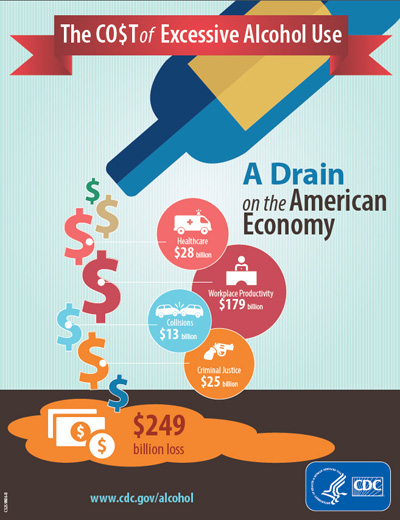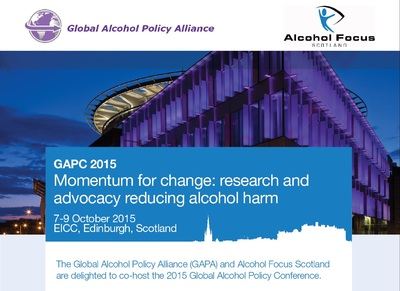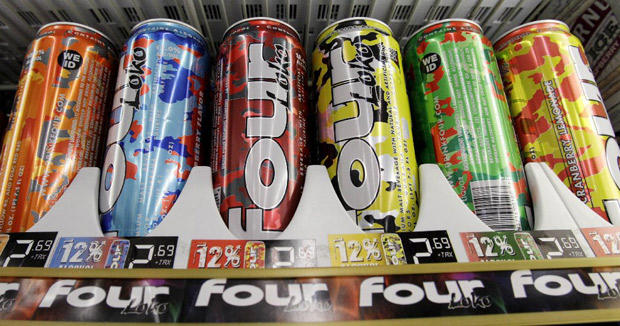Blog
Search
Blog
Major findings released re: costs of alcohol harm, advertising impact
- Details
- Created: Monday, November 09 2015 13:47
November 9, 2015

A new study from the Centers for Disease Control and Prevention (CDC) reveals clear evidence that the costs from excessive alcohol use continue to drain the American Economy. In four years the cost of excessive drinking climbed fifteen cents per drink, due to decreased workplace productivity and healthcare costs. Excessive alcohol consumption is the third-leading preventable cause of death in the United States.
And while the cost of alcohol-related harm continues to rise, alcohol marketing and advertising is also at an all time high. Another new study from researchers at Boston University and Johns Hopkins University reveals a direct link between underage drinking and brand-specific advertisements, both on TV and in magazines. Underage drinkers were found to be five times more likely to consume alcohol brands that are advertised.
The best buys of effective alcohol policy - increased price/taxes, limited outlet density, and restrictions on alcohol advertising - are indicated in these findings. Effective alcohol policy is needed to reduce harm and costs, and to save lives, in the U.S. and around the globe.
Global Alcohol Policy Conference 2015
- Details
- Created: Thursday, October 22 2015 15:26
October 22, 2015

The GAPC declaration reaffirms commitment to, and calls for action on, the following:
- evidence-based actions to reduce alcohol-related harm worldwide;
- a specific indicator of consumption or harm in monitoring progress toward achieving the Sustainable Development Goals;
- implementation of population-wide measures to curb consumption in reducing harm;
- the rights of children to grow up safe from alcohol-related harm;
- WHO global strategies on alcohol and on non-communicable diseases, including the three "best buys" and proven drink-driving reduction strategies;
- protecting government ability to implement evidence-based public health policies regarding alcohol, through strengthening existing instruments or negotiation of a binding public health-oriented global agreement to address alcohol-related harm, independent of commercial interests in alcohol;
- the need to restrict alcohol marketing in all forms, and implementation and evaluation of minimum pricing where appropriate;
- protection of public health and alcohol control policies from commercial and other vested interests of the alcohol industry;
- recognition of alcohol's significant role in injuries, infectious diseases, cancer and a wide range of non-communicable diseases, and mental health and social harms;
- provision of funding from the global philanthropic community to national and international NGOs and research organizations to match the burden of alcohol on health worldwide.
Alcohol causes 3.3 million deaths a year, is the fifth leading cause of death and disability worldwide, and is the leading cause of death and disability for young people ages 15-24 in much of the world. It also causes multiple types of harm to nondrinkers including violence and injury, birth defects, and negative impact on family budgets. See Alcohol: a global concern, a 16-minute film by Alcohol Focus Scotland that premiered at, and was produced for, the conference.
Click here to view Sarah Mart's presentation
State AGs to Phusion: Reduce Alcohol Content
- Details
- Created: Thursday, October 22 2015 05:43
October 22, 2015

Along with removing caffeine from its products after the US Food & Drug Administration's warning in late 2010, the company also increased container size and alcohol content. Supersized alcopops also known as "binge in a can" or "blackout in a can" containing nearly 5 standard drinks, have since become the norm, lining the doors of store coolers where alcopops are sold.
Supersized alcopops are associated with increased dangerous drinking behaviors, injuries, and harm to youth.
Earlier this year, Phusion launched Four Loko Gold, a new supersized alcopop with 14% ABV and 23.5-ounce containers, the highest alcohol content of all Four Loko products (equal to 5.5 standard drinks). The company primarily markets Four Loko Gold through social media, where young drinkers flock to in order to gain access to contests and invitation-only, sponsored parties where the new product is served.
Click here to see our report, From Alcoholic Energy Drinks to Supersized Alcopops.
TAKE ACTION: TELL THE FEDERAL TRADE COMMISSION & ALL STATE ATTORNEYS GENERAL: PHUSION MUST REDUCE ITS ALCOHOL LEVEL
More Articles ...
Subcategories
Help us hold Big Alcohol accountable for the harm its products cause.
| GET ACTION ALERTS AND eNEWS |
STAY CONNECTED    |
CONTACT US 24 Belvedere St. San Rafael, CA 94901 415-456-5692 |
SUPPORT US Terms of Service & Privacy Policy |
Copyright © 2024 Alcohol Justice. All Rights Reserved.
Joomla! is Free Software released under the GNU General Public License.


